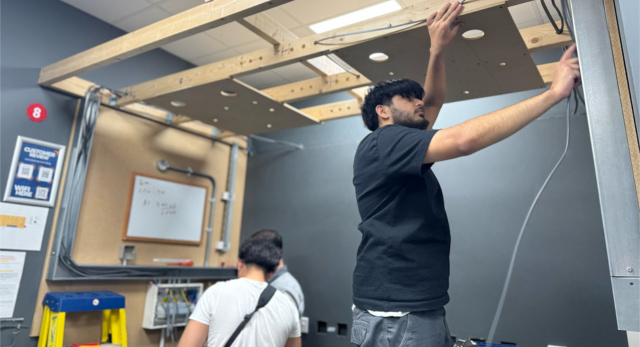The UK’s building services sector is facing a skills crisis that’s threatening everything from housebuilding targets to our Net Zero ambitions. If you’re a business owner, a budding apprentice, or just someone who wants to see the UK’s infrastructure keep up with demand, you need to know what’s at stake and what can be done about it.
This article unpacks the numbers, causes, consequences, and, most importantly, how you, Logic4training, and the wider industry can help close the gap.
What Is the Building Services Skills Gap?
The “skills gap” is the yawning chasm between the number of skilled workers the UK needs and the number actually available. In building services, this covers everyone from gas engineers and electricians to plumbers, carpenters, and project managers. Right now, this gap is less of a crack and more of a canyon.
- 140,000+ construction vacancies are currently unfilled, stalling vital projects and putting pressure on the workforce.
- 1 million additional workers will be needed by 2032 to meet demand for housing, infrastructure, and green energy installations.
- A third of the workforce is set to retire by 2036, with 35% already over 50 and only 20% under 30.
The TrustMark report found that nearly half (45%) of small and micro businesses in the repair, maintenance and improvement (RMI) sector have at least one vacancy, and a staggering 39,000 businesses could disappear in the next decade due to retirements and lack of succession.
Why Is There a Skills Shortage?
Let’s break it down because this isn’t just about people not fancying to learn a trade. The reasons are multi-layered:
An Ageing Workforce
The UK construction industry is staring down the barrel of a demographic time bomb. According to the 2023 UK Trade Skills Index, over 35% of construction workers are now aged 50 or above, with many set to retire in the next decade. This looming “Big Retirement” will see a huge exodus of experience and expertise, leaving a gaping hole that the current pipeline of young talent simply can’t fill fast enough. The TrustMark report highlights that 44% of the RMI workforce is over 55, and 23% of those plan to stop or semi-retire within three years. The sector’s physically demanding nature accelerates this trend, as older workers often leave earlier due to the toll on their bodies. Without a robust influx of new entrants, the industry faces a cliff edge, not a gentle slope.
Fewer Apprenticeships and Low Completion Rates
Apprenticeships are supposed to be the lifeblood of the industry, but the reality is far from rosy. The number of construction apprenticeships has plummeted, with only 713,000 people registered as apprentices in 2021, the lowest since 2010, and nearly half failing to complete their programmes. The latest data shows a 47% drop-out rate among construction apprentices, with only 8,620 reaching End Point Assessment in 2022/23 against an industry need of over 96,000 new staff per year. This “leaky bucket” scenario is made worse by reduced investment in training from both government and employers, who often prefer to hire ready-made talent rather than train their own. The pandemic’s legacy, complex apprenticeship delivery, and lack of coordination between government, academia, and industry all compound the problem.
Brexit and the Loss of EU Workers
Brexit has fundamentally altered the labour landscape. The end of free movement has led to a sharp decline in skilled EU workers, who previously made up a significant portion of the UK construction workforce. This loss has driven up labour costs, created acute shortages, and left employers scrambling to fill roles. The impact is especially pronounced in specialist trades and urban centres, where EU nationals were a vital part of the workforce. Brexit has also triggered supply chain disruptions and increased costs for materials, further straining the sector.
Perception Problems
The construction industry suffers from a persistent image problem. Despite offering rewarding careers and strong earning potential, the sector is still seen by many young people as a last resort, not a first choice. Only around 5% of students actively consider construction roles. Stereotypes about “dirty jobs” and a lack of career progression deter school leavers, while the push towards university education overshadows vocational pathways. This failure to attract and inspire the next generation is a major barrier to closing the skills gap.
Lack of Diversity
The workforce remains overwhelmingly white, male, and ageing. Women account for just 11% of construction roles, with only 1% working on construction sites, and ethnic minorities make up just 5.4% of the workforce, far below their representation in the wider UK labour market. Whilst we are seeing more diversity come through our doors to train with us, this lack of diversity means the industry is missing out on a massive pool of untapped talent and fresh perspectives. Improving diversity isn’t just about fairness. It’s also proven to boost creativity, problem-solving, and business performance.
Digital Skills Deficit
As the sector modernises, digital skills are no longer a “nice to have”. They’re essential. From BIM (Building Information Modelling) and smart home technology to AI and automation, the industry is rapidly evolving. Yet, a lack of digital capability is holding back productivity and innovation. Many workers lack the training or confidence to adopt new technologies, and SMEs, in particular, struggle to invest in digital upskilling. This digital skills drought is compounded by resistance to change and a lack of standardised training requirements, leaving the sector fragmented and inconsistent in its adoption of new tech.
Economic and Supply Chain Pressures
Beyond the skills gap itself, the industry faces mounting economic headwinds. Cost-of-living pressures, inflation, and supply chain disruptions (exacerbated by Brexit and global events) have made recruitment and retention even harder. Rising material and labour costs force firms to tighten budgets, sometimes at the expense of training and development. Uncertainty about the economic outlook makes long-term workforce planning a challenge.
What’s at Stake If We Don’t Fix It?
This isn’t just an industry problem-it’s a national one. Here’s what’s on the line:
Housing Shortages
The government’s target is to build 1.5 million new homes, with annual targets now increased to 370,000 homes per year. However, the skills shortage is a direct threat to delivery. Housing associations and developers already face pronounced worker shortfalls, especially in London and other urban centres, leading to delays, cancellations, and a worsening housing crisis. More than 159,000 children are living in temporary accommodation, and the lack of skilled workers means this number could rise, putting further strain on families and public services.
Delays and Rising Costs
Labour shortages are causing significant delays across all types of construction projects, from housing to hospitals and schools. According to the State of Trade Survey Q4 2022 survey, up to 60% of jobs are stalled due to a lack of skilled workers, and around 70% of builders report delays due to material and labour shortages. These delays drive up costs, erode profit margins, and frustrate clients. The competition for a shrinking pool of skilled labour is pushing wages up faster than the national average, with project costs rising by 10–15% in some cases.
Net Zero and Green Energy Goals
Achieving Net Zero by 2050 is a cornerstone of the UK’s environmental policy, but the skills gap is a major obstacle. The construction industry will need 350,000 new roles by 2028 to deliver on Net Zero commitments, including 230,000+ skilled workers for retrofitting and at least 30,000 for green energy installations such as solar panels, EV chargers, and heat pumps. With 80% of 2050’s buildings already built, the scale of the retrofit challenge is enormous. Failure to close the skills gap will stall progress on decarbonisation, making Net Zero targets unattainable.
Economic Growth
Construction is a powerhouse of the UK economy, contributing £138 billion annually and employing over 3 million people. Without enough skilled workers, the sector’s output will stall, dragging down GDP growth and hitting related industries from manufacturing to logistics. The skills shortage also makes the UK less attractive for both domestic and international investment, as uncertainty and inefficiency undermine confidence in the sector.
Reputation and Quality
A shrinking, overstretched workforce increases the risk of corners being cut, leading to lower quality work, more defects, and compromised safety standards. The industry’s reputation suffers, making it even harder to attract new talent and secure future projects. Poor quality and delays can also have knock-on effects for public trust, especially in high-profile infrastructure and housing schemes.
In summary, the skills shortage in UK building services is a complex, multi-faceted crisis with far-reaching implications. Addressing it requires coordinated action across government, industry, and education to attract, train, and retain a diverse, digitally-savvy, and future-ready workforce.
Which Trades Are Most in Demand?
Let’s get specific. According to the latest data, the most in-demand trades are:
| Trade | Current Vacancies |
|---|---|
| Builders | 52,113 |
| Electricians | 12,005 |
| Plumbers | 11,928 |
| Gas Engineers | 9,873 |
| Flooring Contractors | 7,812 |
| Painters | 7,597 |
| Carpenters | 6,997 |
| Window Cleaners | 5,887 |
| Joiners | 5,729 |
| Roofers | 4,547 |
Data source from Construction and Building Trades: The Skills Horizon
Employment for plasterers, bricklayers, and tilers is in a healthier state, but demand for core building services continues to outstrip supply. Regional hotspots include joiners in Edinburgh and Leeds, gas engineers in Birmingham and Liverpool, and flooring contractors in London.

What’s Being Done to Bridge the Gap?
1. Investment in Apprenticeships and Training
The UK government has recently announced a £600 million boost to train UK construction workers, representing one of the largest funding commitments to the sector in recent years. This substantial investment is set to create thousands of new training opportunities, expand apprenticeship places, and help address the acute skills shortage across building services and construction.
The breakdown of the £600m looks like:
- Technical Excellence Colleges: £100 million will fund 10 new colleges dedicated to construction training.
- Expanding Existing Courses: £165 million will help colleges offer more construction-related courses.
- Skills Bootcamps: £100 million will be invested in sector-specific bootcamps.
- Foundation Apprenticeships: Launched in August 2025, these will receive a £40 million boost.
- Industry Placements: Over 40,000 placements for Level 2 and Level 3 learners will be funded annually.
Should you be looking to learn more about trade apprenticeships, see how Logic4training Apprenticeships can help you become an apprentice or help your business hire an apprentice.
2. Expanding Skills and Training
The TrustMark report calls for increased support for trades within the school curricula, delivered by expert trainers, and for the creation of networks for trade professionals willing to give back through mentoring, teaching, or developing course content. This is an area where training providers like ourselves play a crucial role. By employing ex-industry professionals as trainers and actively engaging experienced tradespeople in course delivery and mentoring, we ensure that learners benefit from real-world expertise and up-to-date industry knowledge.
At Logic4training, we’ve seen firsthand how this approach boosts learner confidence, bridges the gap between theory and practice, and inspires the next generation to pursue a career in building services. We’re committed to not only delivering high-quality, practical training but also supporting the wider sector by building networks of professionals who are passionate about sharing their skills and shaping the future workforce. This collaborative, experience-led model is essential for keeping training relevant, engaging, and effective, which is exactly what the industry needs to tackle the skills gap head-on.
3. Diversity and Inclusion Initiatives
The sector is actively working to broaden its talent pool by attracting more women, ethnic minorities, and underrepresented groups. Organisations such as LCL Awards have created the LCL Awards Inclusivity Charter, which encourages approved centres to create welcoming, flexible training environments that suit people from all walks of life, with annual audits ensuring high standards are maintained.
We believe that fostering a diverse and inclusive environment not only improves learner confidence and success but also helps to address the wider skills gap by opening up opportunities to underrepresented groups. By working in line with the LCL Awards Inclusivity Charter, Logic4training is helping to shape a sector where everyone feels valued, respected, and empowered to achieve their highest potential.
4. Embracing Digital and Green Skills
With the industry rapidly modernising, there’s a major push to embed digital and green skills into all levels of training. Innovate UK’s “AI in Construction: Skills for the Future” programme is helping demystify artificial intelligence for leaders and managers, offering free online training in AI project management, automation, and predictive analytics. This ensures the workforce is ready for the next wave of technological innovation.
On the green skills front, training providers around the country, ourselves included, are offering specialist courses in renewables, such as heat pumps, solar PV, EV charging, and retrofit techniques, preparing workers to deliver on the UK’s Net Zero and sustainability targets. These courses are generally available for existing workers, ensuring the sector is equipped to lead the green transformation.
The sector’s response is bold and coordinated. Record investment in apprenticeships, a new generation of skills hubs, a drive for diversity and inclusion, and a future-focused approach to digital and green skills. Together, these measures are designed to build a resilient, skilled, and adaptable workforce ready to meet the UK’s building services challenges head-on.
How Can You Get Involved?
Whether you’re an employer, a potential apprentice, or a career-changer, there’s never been a better time to get involved in building services.
For Employers:
- Invest in training and upskilling your workforce.
- Support apprenticeships and mentoring schemes.
- Embrace diversity and inclusion in your hiring practices.
For Individuals:
- Consider a career in building services-there’s huge demand and great earning potential.
- Explore Logic4training’s courses to find the right fit for you.
- Don’t be afraid to upskill or retrain!
For Policymakers:
- Continue to invest in apprenticeships and training.
- Support initiatives that make the sector more attractive to young people, women, and minorities.
- Remove barriers to entry and progression in the industry.

Leading the Charge
At Logic4training, we’re not just talking about the skills gap-we’re doing something about it. With over 20 years of experience, we’ve evolved to meet the changing needs of the sector, offering training in gas, plumbing, electrical, renewables, and more.
Our courses are designed for everyone: from complete beginners to experienced operatives looking to upskill or diversify. We offer:
- Plumbing Courses
- Gas Courses
- Electrical Courses
- Renewables Training Courses
- Refrigeration Course
- Oil Training Courses
- Property Maintenance Courses
- Smart Meter Courses
- Bespoke Business Training
Our Essential Site Skills course is a game-changer for building services installers. It covers everything from safe site working and carpentry to tiling and plastering, so you can deliver a complete, professional job without needing to call in extra trades.
Mark Krull, Managing Director at Logic4training
“Being a plumber, heating engineer, or domestic electrical installer is about more than the technicalities of installation-there are always secondary tasks to complete that, in the eye of the customer, are just as important.”
We also support businesses looking to upskill their teams, ensuring they can meet customer expectations and stay ahead of the competition.
The Future
The building services sector is changing fast. Practical skills, sustainability, and diversity are the watchwords of the future, and the industry is poised for steady growth expected to expand by around 1.5% annually, with private housing construction forecasted to rise by 2.1% each year. This positive outlook is fuelled by government investment in infrastructure, the drive for energy-efficient homes, and a growing emphasis on digital transformation and green building practices. However, none of this progress will be possible without a skilled and adaptable workforce. The transition to Net Zero alone will require an estimated 350,000 new construction roles by 2028, highlighting the urgent need for ongoing investment in training, apprenticeships, and workforce development.
If we act now, investing in people, practical training, and new technologies, the UK can meet its ambitious housing, infrastructure, and Net Zero targets while building a more inclusive and innovative sector. Diversity initiatives, digital upskilling, and sustainability-focused training are all crucial for ensuring the industry reflects the society it serves and is resilient in the face of future challenges. But if we fail to close the skills gap, the consequences will be felt for generations, with stalled projects, missed climate goals, and a less competitive economy. The time to invest in the future of building services is now.
FAQs
What is the building services skills gap?
The skills gap refers to the shortage of qualified workers in building services roles like plumbing, gas, electrical, and renewables. This shortage is causing project delays, rising costs, and threatens the UK’s ability to meet housing and Net Zero targets.
Which trades are most in demand right now?
Builders, electricians, plumbers, gas engineers, and carpenters are among the most sought-after trades, with thousands of vacancies across the UK.
What are the main causes of the skills shortage?
Key factors include an ageing workforce, low apprenticeship completion rates, loss of EU workers post-Brexit, lack of diversity, and a deficit in digital and green skills.
How is Logic4training helping to close the gap?
Logic4training offers a wide range of courses for new entrants and experienced professionals, including essential site skills, gas, plumbing, electrical, and renewables. We focus on practical, real-world training to ensure learners are job-ready.
What can individuals do to help bridge the skills gap?
Consider a career in building services, upskill with Logic4training’s courses, and encourage others to explore opportunities in the sector. Employers can support apprenticeships and invest in training to futureproof their businesses.
Ready to be part of the solution? Explore our courses and apprenticeships to take the next step in your building services career today. The future of the UK’s infrastructure, and your own, depends on it.






